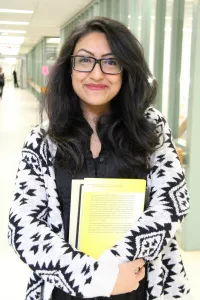
Community and opportunity: Mehak Kawatra reflects on her years at UTM
When U of T Mississauga student Mehak Kawatra crosses the dias at Convocation Hall in May, she’ll be taking the next step along a path that she hopes will one day lead her to the United Nations.
As she looks ahead, Kawatra is feeling reflective about the lessons she’s learned during her time at UTM. Born in India and raised in Mississauga, Kawatra initially chose UTM for “a sense of community."
“I didn’t want to be just one in a sea of faces,” she says. “The campus has grown while I’ve been a student here. Wherever I go, there’s a crowd. It’s harder to find a spot to study, but it means the school has grown as I’ve grown. I love it.”
Kawatra, who will graduate with a double major in English and criminology and a minor in sociology, treasures the chances she had to explore her diverse interests at UTM.
One of the defining moments of her undergraduate years came when she nabbed a Research Opportunity Program placement with assistant professor Liza Blake, of the Department of English and Drama. Kawatra assisted Blake with a project studying 16th century translations by Arthur Golding of Aesop’s fables. Kawatra even got the chance to visit Golding’s manuscripts at Columbia University. “We spent three days looking at his manuscripts. It was phenomenal,” Kawatra says. “When I came back, I knew two things: for me to have a fun time at university, I need to get out of the classroom; and two, I needed to be more open to different experiences and talk to professors and peers.”
With that in mind, Kawatra forged ahead. She spent a semester in the Walls to Bridges program, led by assistant professor Philip Goodman, where she studied with classmates incarcerated in an Ontario correctional facility. She also found time for a second research opportunity, this time working with associate professor Erik Schneiderhan, of the Department of Sociology, to review literature on sexual assault on Canadian university campuses. Kawatra will present the researh team's findings at the Canadian Sociological Association conference in May 2017, and her work will support next steps in Schneiderhan’s study.
Through it all, Kawatra also found time for fun. While president of the English and Drama Student Society, she was part of a team that ran a journal and graduate workshops, an activity that helped her to find a sense of community on campus. Her position as academic society coordinator for UTM’s Student Union connected her with campus clubs and societies—“I met some of my best friends there,” she says. And the student who confesses that she was once too timid to venture past the first floor of the library now considers the building her go-to spot. “In first year, I was too intimidated to move past the first floor. I did all of my studying between the reserve shelves and the study tables,” she says. “In second year, I moved to the study rooms and the Astro Lab. In my final years, I moved up to the fourth floor—it’s a nice space for students who want to study, but want to be social, too. That’s part of student life.”
In the fall, Kawatra will begin her first year at U of T's Faculty of Law. Ultimately, she hopes to practice human rights law at the United Nations. “It’s not even a choice—it’s my part as a world citizen,” she says.
“Convocation will be bittersweet,” she says. “I’ll miss UTM because I never thought I would be this person. Who I will be at Convocation is 90 per cent the product of who I met and who I talked to at UTM. The professors, staff and students –I’m a composite of their conversations and guidance. I owe this school quite a lot.”
